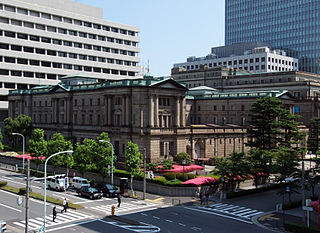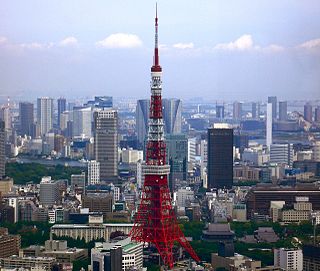
The economy of Indonesia is a mixed economy with dirigiste characteristics,and it is one of the emerging market economies in the world and the largest in Southeast Asia. As an upper-middle income country and member of the G20,Indonesia is classified as a newly industrialized country. Indonesia nominal GDP reached 20.892 quadrillion rupiah in 2023,it is the 16th largest economy in the world by nominal GDP and the 7th largest in terms of GDP (PPP). Indonesia's internet economy reached US$77 billion in 2022,and is expected to cross the US$130 billion mark by 2025. Indonesia depends on the domestic market and government budget spending and its ownership of state-owned enterprises. The administration of prices of a range of basic goods also plays a significant role in Indonesia's market economy. However,micro,medium and small companies contribute around 61.7% of the economy and significant major private owned companies and foreign companies are also present

The Bank of Japan is the central bank of Japan. The bank is often called Nichigin (日銀) for short. It is headquartered in Nihonbashi,Chūō,Tokyo.

The 1997 Asian financial crisis was a period of financial crisis that gripped much of East and Southeast Asia during the late 1990s. The crisis began in Thailand in July 1997 before spreading to several other countries with a ripple effect,raising fears of a worldwide economic meltdown due to financial contagion. However,the recovery in 1998–1999 was rapid,and worries of a meltdown quickly subsided.

The Reserve Bank of India is India's central bank and regulatory body responsible for regulation of the Indian banking system. Owned by the Ministry of Finance of the Government of India,it is responsible for the control,issue and maintaining supply of the Indian rupee. It also manages the country's main payment systems and works to promote its economic development.

The rupiah is the official currency of Indonesia,issued and controlled by Bank Indonesia. Its name is derived from the Sanskrit word for silver,rupyakam (रूप्यकम्). Sometimes,Indonesians also informally use the word perak in referring to rupiah in coins. The rupiah is divided into 100 cents,although high inflation has rendered all coins and banknotes denominated in cents obsolete.

The Czech National Bank,is the central bank and financial market supervisor in the Czech Republic,headquartered in Prague. It is a member of the European System of Central Banks. It was established on 1 January 1993 from the division of the State Bank of Czechoslovakia as part of the process of dissolution of Czechoslovakia,together with the National Bank of Slovakia.
Bank rate,also known as discount rate in American English,and (familiarly) the base rate in British English,is the rate of interest which a central bank charges on its loans and advances to a commercial bank. The bank rate is known by a number of different terms depending on the country,and has changed over time in some countries as the mechanisms used to manage the rate have changed.

The Japanese asset price bubble was an economic bubble in Japan from 1986 to 1991 in which real estate and stock market prices were greatly inflated. In early 1992,this price bubble burst and Japan's economy stagnated. The bubble was characterized by rapid acceleration of asset prices and overheated economic activity,as well as an uncontrolled money supply and credit expansion. More specifically,over-confidence and speculation regarding asset and stock prices were closely associated with excessive monetary easing policy at the time. Through the creation of economic policies that cultivated the marketability of assets,eased the access to credit,and encouraged speculation,the Japanese government started a prolonged and exacerbated Japanese asset price bubble.
Debt monetization or monetary financing is the practice of a government borrowing money from the central bank to finance public spending instead of selling bonds to private investors or raising taxes. The central banks who buy government debt,are essentially creating new money in the process to do so. This practice is often informally and pejoratively called printing money or (net) money creation. It is prohibited in many countries,because it is considered dangerous due to the risk of creating runaway inflation.

Bank Indonesia (BI) is the central bank of the Republic of Indonesia. It replaced in 1953 the Bank of Java,which had been created in 1828 to serve the financial needs of the Dutch East Indies.

Quantitative easing (QE) is a monetary policy action where a central bank purchases predetermined amounts of government bonds or other financial assets in order to stimulate economic activity. Quantitative easing is a novel form of monetary policy that came into wide application after the 2007–2008 financial crisis. It is used to mitigate an economic recession when inflation is very low or negative,making standard monetary policy ineffective. Quantitative tightening (QT) does the opposite,where for monetary policy reasons,a central bank sells off some portion of its holdings of government bonds or other financial assets.
The establishment of the Indonesian Bank Restructuring Agency (IBRA),lit. "National Banking Revitalization Agency") in early 1998 was one of a series of steps taken by the Indonesian government,in agreement with the International Monetary Fund on 15 January 1998,in response to the banking and economic crisis which emerged following the onset of the Asian monetary crisis in mid-1997. Among other things,the drastic depreciation of the rupiah (Rp) reduced bank liquidity,and loss of public confidence in the rupiah and the banking system in general.

Sri Mulyani Indrawati is an Indonesian economist who currently serves as the Minister of Finance of Indonesia as part of the Onward Indonesia Cabinet;her term ends in 2029.

Sveriges Riksbank,or simply the Riksbank,is the central bank of Sweden. Founded in 1668,it is the world's oldest surviving central bank,and the third oldest bank in continuous operation. Prior to World War I,it was also the only state-owned central bank outside of the Russian Empire.

J. Soedradjad Djiwandono is an Indonesian economist who was the Governor of Bank Indonesia,the nation's central bank,from 1993 until his sudden dismissal in 1998.
Richard Andreas Werner is a German banking and development economist who is a university professor at University of Winchester.

The capital of Indonesia,officially the capital of the Unitary State of the Republic of Indonesia,is Jakarta,one of the oldest continuously inhabited cities in Southeast Asia. However,since the enactment of the Special Region of Jakarta Act,Jakarta has lost its de jure status as capital of Indonesia,and is currently in a transitional period due to the relocation of the capital to Nusantara.

The currency of Indonesia,the rupiah,has a long history dating back to its colonial period. Due to periods of economic uncertainty and high inflation,the currency has been re-valued several times.

On 20 February 2020,stock markets across the world suddenly crashed after growing instability due to the COVID-19 pandemic. It ended on 7 April 2020.
















